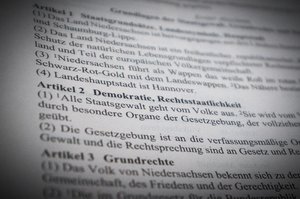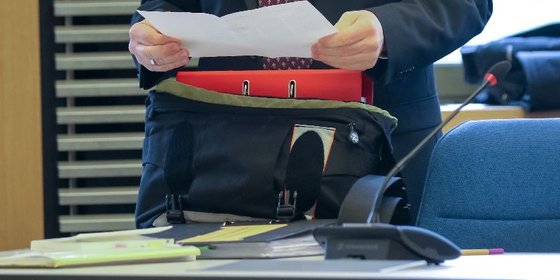Oversight

Comprehensive oversight by Parliament
The State Parliament is an oversight body with very extensive powers enshrined in the constitution. One of the key roles of the State Parliament is to keep a close eye on the state government, which significantly shapes policy in Lower Saxony. The State Parliament has an extensive repertoire of powers to question the government and a wide ranging power of investigation at its disposal for the purposes of scrutinising the work of government. This oversight role of Parliament is a major feature of a parliamentary system such as ours. The government is not elected directly by the people, but rather by a majority in Parliament. Governments elected in this way rely on the trust of the parliamentary majority from the time of its election and can be voted out of office at any time if a majority of the Members of the State Parliament elect a new prime minister for the state. This special process is known as a constructive vote of no confidence; the head of the state government can only be voted out of office if a new one is elected at the same time (Article 32 of the Constitution of Lower Saxony). The immense influence Parliament has in this respect an expression of representative democracy: Members of the State Parliament are the only directly elected representatives of all of the people in Lower Saxony.
Other powers of an independent parliament
Some powers that ensure the independence of the State Parliament – overseeing the government for example – are closely linked to the parliamentary oversight mechanisms.
The power of self-assembly
The State Parliament itself determines when it sits. It also sets the agenda and scope of each sitting. This might sound like a formal matter of course. However, the exclusive power of the State Parliament to assemble independently ensures that no one – not even the state government – can stipulate whether and when certain matters are discussed in the plenary session.
Rules of procedure
The rules of procedure are a bit like the instruction manual for parliamentary work. The rules of procedure substantiate constitutional rights and processes. They also contain regulations about the role and composition of the presidium or the agenda of the plenary sittings and committee meetings. At the beginning of each parliamentary term, Parliament sets (new) rules of procedure. No one apart from the State Parliament itself is allowed to set the rules for parliamentary deliberations.
Power of electoral scrutiny
If there is any doubt about the validity of a State Parliament election, Parliament is entitled to review it upon request and adjudicate on the objections lodged.
Power to self-dissolve
The State Constitution (Articles 10 and 30) allows the State Parliament to dissolve itself and organise new elections. The State Parliament can do this through a resolution by a simple majority if it has not been possible to form a new government within 21 days of the assembly of a newly elected State Parliament or the resignation of a state government. Aside from this concrete reason, the State Parliament can only dissolve itself if two-thirds of its members in attendance, or at least the majority of all members, vote in favour of the dissolution.
Separate yet intertwined – the relationship between the state authorities

The State Parliament has the power to legislate (legislature), the state government has the power to enforce laws (executive) and the independent courts have the power to administer justice (judiciary) - this sums up the principle of the separation of powers, which is a hallmark of all modern democracies. The separation of powers together with mutual independence and oversight prevents abuses of power, especially by the state towards its citizens.
The classical principle of separating powers, often referred to as ‘checks and balances’, does not, however, exist in its pure form in parliamentary systems such as that in Lower Saxony. Although the jurisdiction of Parliament and government are completely independent, the executive and legislature are not truly opposite numbers. On the contrary: there is a lot of overlap between the State Parliament and state government in terms of staff - the state’s prime minister comes from Parliament, or more precisely from the government majority, and is elected by it. This intertwining of powers is particularly striking on the chamber floor: the state’s prime minister has a set place both on the government bench and in the plenary session with their parliamentary group. The governing parties have a strong interest in supporting the government they uphold. After all, it is the government that implements the political agendas of the parliamentary majority. It is, therefore, all the more incumbent on the opposition to closely scrutinise the government. It forms a key part of a functioning representative democracy.
State Parliament = legislative power
- The State Parliament is made up of MPs - directly elected representatives of the people.
- The State Parliament has a very special position amongst the constitutional bodies: it is the only one to be directly elected by the people. In other words, it has the most democratic legitimacy.
- The State Parliament passes the state laws executed by the government and scrutinises the work of the state government.
- The President is the highest ranking representative of the State Parliament.
State government = executive power
- The state’s prime minister and the ministers elected by the State Parliament form the state government, also known as the cabinet.
- The state’s prime minister nominates the ministers, who then have to be approved by the State Parliament.
- The state’s prime minister is the highest representative of the state government. The state prime minister’s office is the State Chancellery. The offices of the other members of the state government are called ministries.
- Although the executive includes the ministries and their subordinate offices, the state government is the actual constitutional body.
- The state government executes the state laws passed by the State Parliament and has a special obligation to inform Parliament in certain cases.
Constitutional Court = judicial power
- The Constitutional Court of Lower Saxony is called the Verfassungsgericht Niedersachsens.
- The Constitutional Court is made up of nine members who are led by the president of the Constitutional Court.
- The members of the Constitutional Court are elected by the State Parliament.
- The responsibilities of the Constitutional Court include ruling on constitutional disputes of the highest state authorities, on disputes in the implementation of direct democratic elements, on charges against MPs as well as reconciling state laws with the state constitution.
- The judiciary power also includes all the other courts, but the Constitutional Court is the only constitutional body.


